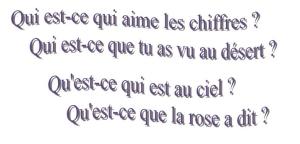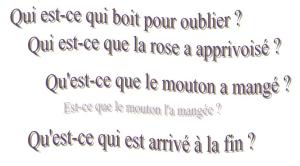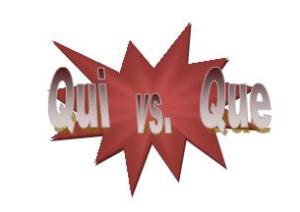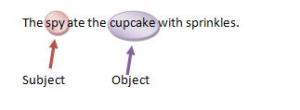Okay, so this grammar point maybe isn't convoluted enough to deserve to be labeled a "saga." Last week, in this post about super-spies and couch potatoes, we talked about the fact that "qui" refers to the subject of a sentence while "que" refers to the object – regardless of whether these were people or things.
Today we're going to review the exception to this rule. You knew it was coming, right? There's always an exception. Where's the fun if there isn't? If the super-spy always gets the documents and the girl without a hitch, the film is pretty dull.
For the grammophiles among you – the difference comes down to parts of speech. In last week's post, "qui" and "que" were relative pronouns « des pronoms relatifs », but this week we are talking about "qui" and "que" as interrogative pronouns « des pronoms interrogatifs ». For example:

Here you can see that the second "qui" or "que" is following the rules for the super-spy and the couch potato. However, the "qui" or "que" that introduces the question now refers to a person or a thing.
Who loves numbers? (Who is it that loves numbers?)
Who did you see in the desert? (Who is it that you saw in the desert?)
What is in the sky? (What is it that is in the sky?)
What did the rose say? (What is is that the rose said?)
Of course, in the last two questions the "que" at the beginning of the sentence become "qu" with an apostrophe joining it to "est-ce" because "est-ce" starts with a vowel.
And a few more examples:

Fairly straightforward, but remember – the point her is that "qui" and "que" are asking questions. A sentence doesn't have to have the question phrase "est-ce que" to be a question. For example:
Que fait le buveur ?
Qui êtes-vous ?
Of course, a great way to practice these pronouns is simply to read them and use them. If you don't immediately recognize the references in this post then you are missing out and your Francophone education has been sorely lacking. You can practice your pronouns and fix this glaring hole in your education by checking out the following book:
http://rcm.amazon.com/e/cm?lt1=_blank&bc1=FFFFFF&IS2=1&bg1=FFFFFF&fc1=000000&lc1=DF9E1E&t=aegtra-20&o=1&p=8&l=as4&m=amazon&f=ifr&asins=2070612759 http://rcm.amazon.com/e/cm?lt1=_blank&bc1=FFFFFF&IS2=1&bg1=FFFFFF&fc1=000000&lc1=D79224&t=aegtra-20&o=1&p=8&l=as4&m=amazon&f=ifr&asins=0156012197
(Same book, different cover/size. I've always had a fondness for the blue cover.) I love this book. It's great for children and adults alike. Check it out!


